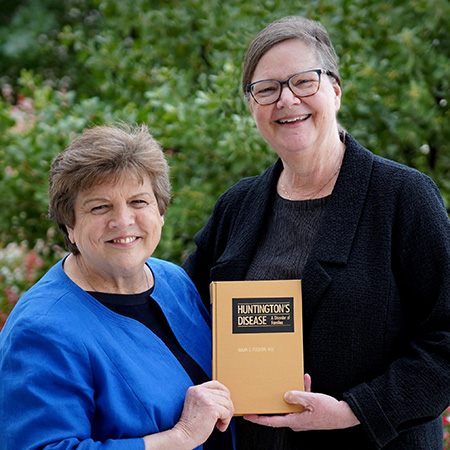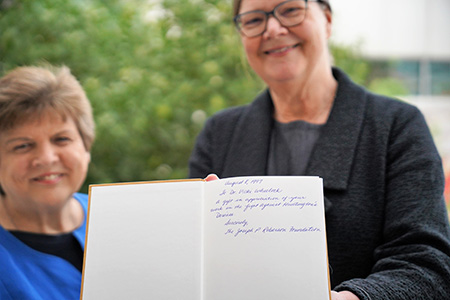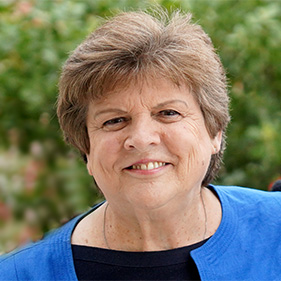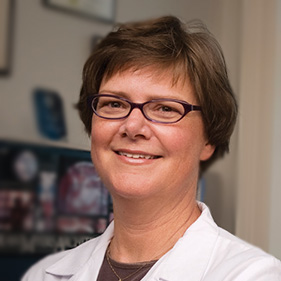It all started with a lunch meeting at Ettore's. One afternoon in 1997, UC Davis Health neurologist Vicki Wheelock received an invitation from Judy Roberson to meet at the Sacramento bakery. They talked about what UC Davis Health could do to advance research and care for patients with Huntington's disease (HD), a hereditary, degenerative brain disease that eventually results in death.

Roberson is president of the Joseph P. Roberson Foundation, which was started by her brother-in-law, Joe, after his diagnosis with HD.
"I was inspired by Joe's legacy and Judy's story, vision and drive," Wheelock shared. "I've learned so much from her as a compassionate family member and caregiver."
At the time, there was no clinic in Northern California that specialized in Huntington's disease. Joe Roberson's vision in launching the foundation was to change that.
"Huntington's disease is best described as having Alzheimer's, Parkinson's, MS [multiple sclerosis] and ALS [known as Lou Gehrig's Disease] all at the same time. HD is a huge challenge, and we need help!" Roberson explained.
Wheelock, who didn't have a research background, trusted Roberson's instincts. "It was Judy's suggestion that UC Davis do more for HD," Wheelock said. "She saw opportunities here."
That same year, thanks to committed, ongoing support from the Joseph P. Roberson Foundation, the UC Davis Huntington's disease clinic launched, with eight patients. Wheelock co-directed it with nurse practitioner Terry Tempkin.
And so, it came to be that three visionary, compassionate women collaborated to create the clinic — and a partnership was born.
Huntington's disease is best described as having Alzheimer's, Parkinson's, MS and ALS all at the same time. HD is a huge challenge, and we need help! Sadly, our family is not done with HD, so the UC Davis Huntington's Disease Clinic will continue to be where we seek care and encouragement. Dr. Wheelock listens to us. She believes us. She cares for all of us."-Judy Roberson
The Joseph P. Roberson Foundation has continued to help fund the center over the past 25 years, and recently reached a major milestone: $1 million in donations.
"What's unique about the Roberson Foundation and some others is that they are funding care directly," Wheelock explained. "Why is this needed? Multidisciplinary care is expensive."
Funding also comes from the Charles and Margaret Pue Foundation and the Huntington's Disease Society of America – much of it from the group's Northern California chapter – and others.
What is Huntington's Disease?
Huntington's disease is a brain disorder that causes neurons to die in the brain, creating changes in a person's movement, thinking and mood. It occurs in about 1 in every 10,000 people around the world. Onset varies, but usually begins between 30 and 50 years old. Children of a parent with HD have a 50% chance of inheriting the gene and developing symptoms.
Symptoms include movement problems, such as tics, difficulty swallowing and balance problems, and cognition challenges such as difficulty with multi-tasking and initiating thoughts and activities. Depression, anxiety, delirium and mania are also possible.
Ultimately HD is fatal. Many treatments exist to help manage the symptoms; however, there is no cure. UC Davis is one of the leading institutions working to change this.
Huntington's Disease Clinic grows into one of the nation's largest
The UC Davis Huntington's Disease Clinic began with eight patients in 1997. Since then, the clinic has seen 825 new patients and conducted 5,280 follow-up visits, including 322 visits in 2022 alone.
The clinic is now one of the largest in the country. It receives support from the Huntington's Disease Society of America (HDSA) as a Center of Excellence for its expertise in clinical care. It is the first and only Level 1 HDSA Center for Excellence for Huntington's Disease in Northern California.
The clinic's multidisciplinary team is run by Founding Director Wheelock, and co-directed by Lorin Scher from the Department of Psychiatry and Behavioral Sciences and movement disorders specialist Alexandra Duffy. It also includes licensed clinical social worker Lisa Mooney, genetic counselor Mara Sifry and physical therapist Michael Sterken. The team serves HD patients ranging from age 16 to age 80 and beyond. They come from all over northern California and the Central Valley, extending to Oregon and Nevada.
The center's mission through the years
Roberson helped UC Davis get involved in research through a consortium called the Huntington Study Group, starting with the clinic's first eight patients.
Participation in the study group helped to advance the center's three-pronged mission:
- To provide excellent, comprehensive and compassionate care and outreach to families
- To provide expert education to families, researchers and health care providers
- To advance Huntington's disease research

Wheelock became deeply involved with the study group and rose to prominence as a national and international leader in the field. Over the last few years she and other UC Davis researchers have published studies aimed at finding treatments through gene modification and stem cells. They've also published findings about the increased risk of subdural hematoma (when blood collects outside of the brain) for Huntington's patients.
"Over the decades, I've watched Dr. Wheelock as she greets and cares for HD patients and their families with warmth and acceptance. Her clinic is a safe, comfortable space where stigma does not exist," Roberson said.
Wheelock, for her part, continues to be inspired by Roberson, who is known internationally for her advocacy.
"The deep relationships possible with families and family foundations bring value far beyond the monetary," Wheelock emphasized. "Annual meetings around the Roberson family dining room table bring us truly visionary ideas and strategies, and the community connections made through and sustained by families and family foundations are what make these dreams reality."
Roberson and Wheelock possess a deep mutual respect, built over 25 years of partnership.
"Dr. Wheelock's compassion toward not only my family but hundreds of others is remarkable," Roberson said. "Sadly, our family is not done with HD, so the UC Davis HD Center of Excellence will continue to be where we seek care and encouragement. Dr. Wheelock listens to us. She believes us. She cares for all of us. There's no one else like her!"
The deep relationships possible with families and family foundations bring value far beyond the monetary. Annual meetings around the Roberson family dining room table bring us truly visionary ideas and strategies, and the community connections made through and sustained by families and family foundations are what make these dreams reality." -Vicki Wheelock
Interested in supporting the UC Davis Huntington's Disease Clinic? You may contact Alexa Adams with the UC Davis Huntington's Disease Clinic at 279-210-8548 or via [email protected]. Or, give online.
Huntington's disease resources








